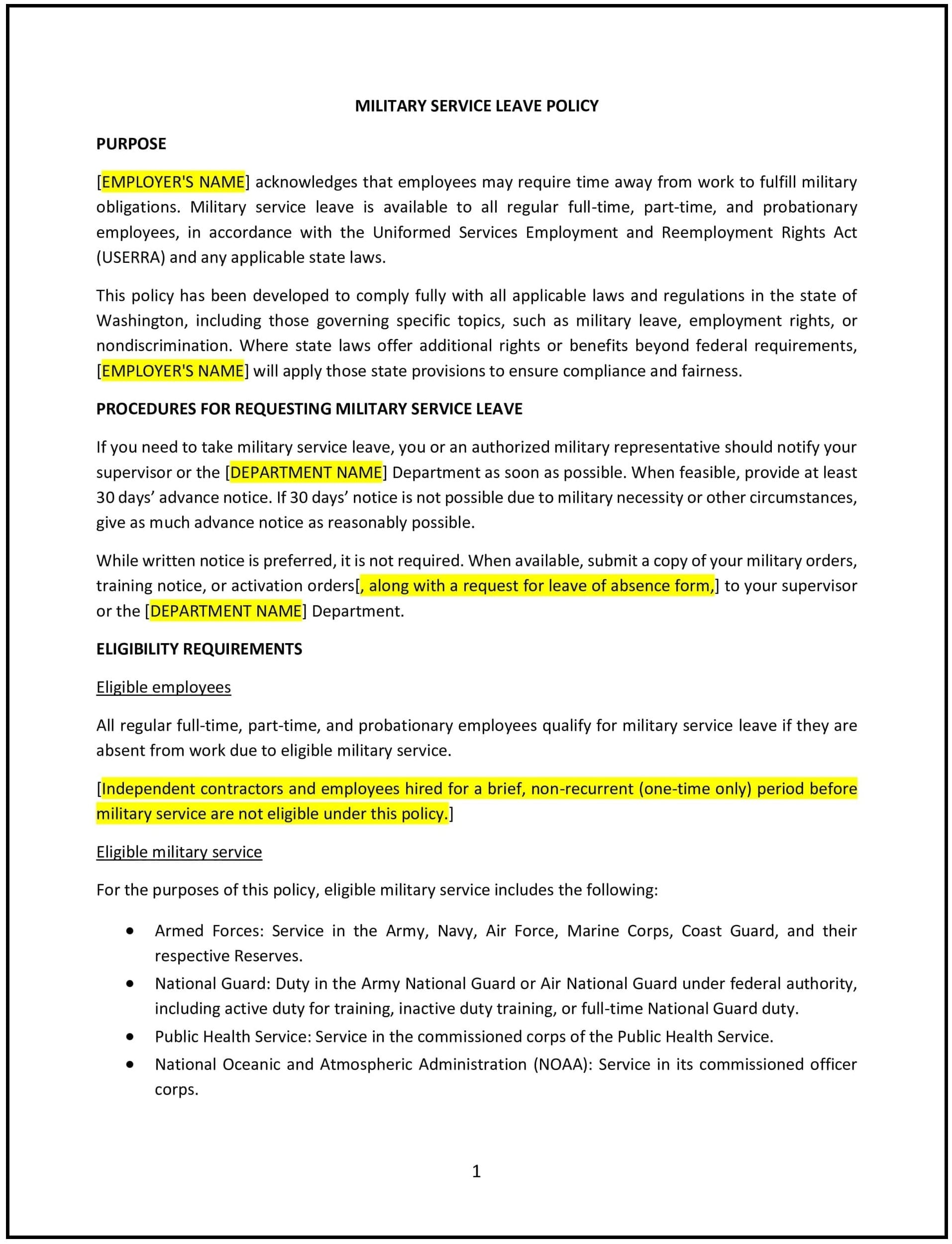Military service leave policy (Washington): Free template
Got contracts to review? While you're here for policies, let Cobrief make contract review effortless—start your free review now.

Customize this template for free
This military service leave policy is designed to help Washington businesses comply with state and federal laws regarding employee leave for military service. The policy outlines the procedures for granting military leave, the duration of leave, and the employee’s rights during and after their time away for service. It ensures that employees who serve in the military are supported while fulfilling their duties and are able to return to their positions after their service ends.
By adopting this policy, businesses can demonstrate their commitment to supporting employees who serve in the military, while enhancing compliance with Washington state laws, federal regulations, and industry standards.
How to use this military service leave policy (Washington)
- Define eligibility for military service leave: The policy should specify which employees are eligible for military leave, including full-time, part-time, and temporary employees who are members of the military reserves or National Guard or are called up for active duty. The policy should explain the types of military service that qualify for leave, including both training and deployment.
- Establish leave duration: The policy should clarify the amount of leave employees are entitled to when they are called for military service. In Washington, employees are entitled to leave in accordance with both the federal Uniformed Services Employment and Reemployment Rights Act (USERRA) and Washington state law. The policy should also specify whether the leave is paid or unpaid.
- Address the continuation of benefits: The policy should specify whether employees on military leave continue to receive benefits such as health insurance, retirement contributions, or other perks. If benefits are continued, the policy should outline any employee responsibilities, such as paying for continued coverage.
- Provide guidance on job protection: The policy should make clear that employees are entitled to return to their previous position or an equivalent position after their military service, as required by USERRA and Washington state law. It should also clarify the process for reemployment and how long employees are entitled to job protection following their return.
- Outline employee responsibilities during leave: The policy should specify any responsibilities employees have while on military leave, such as notifying the company of their leave, providing military orders, and updating the company on their return-to-work status. This helps businesses plan for employee absences and ensure a smooth transition when employees return to work.
- Ensure compliance with Washington and federal laws: The policy should comply with Washington state laws, such as the Washington Law Against Discrimination (WLAD), and the federal USERRA, which provides protections for employees called to active military duty. The policy should outline how the business will support employees in maintaining these legal rights.
- Review and update regularly: Periodically review and update the policy to ensure it remains compliant with any changes to Washington state laws, federal regulations, and the business’s operations. Regular updates will help ensure the policy stays relevant and effective.
Benefits of using this military service leave policy (Washington)
This policy offers several benefits for Washington businesses:
- Promotes support for employees in military service: By offering clear guidelines and support for employees called to military service, the policy demonstrates the company’s commitment to supporting those who serve in the military.
- Reduces legal risks: The policy helps businesses comply with USERRA and Washington state laws, reducing the risk of legal issues or complaints related to military leave.
- Enhances employee loyalty and retention: Providing military leave benefits can increase employee satisfaction and loyalty, as employees feel supported in their civic duties. This can lead to improved retention and a positive company culture.
- Promotes a respectful and inclusive workplace: The policy fosters a work environment where employees who serve in the military are valued and respected, enhancing diversity and inclusivity in the workplace.
- Helps with workforce planning: By establishing clear procedures for handling military leave, the policy helps businesses plan for employee absences and ensures that work continues smoothly during the absence.
- Supports corporate social responsibility: Supporting employees who serve in the military reflects the company’s commitment to social responsibility, which can enhance the company’s reputation in the community.
Tips for using this military service leave policy (Washington)
- Communicate the policy clearly: Ensure all employees are aware of the military service leave policy and understand their rights and responsibilities. Include the policy in the employee handbook, review it during onboarding, and provide periodic reminders.
- Maintain open communication with employees: Encourage employees to notify the company promptly when they are called to military service and to provide relevant documentation, such as military orders. Clear communication will help manage absences and promote compliance with legal requirements.
- Monitor benefits during military leave: Ensure that employees on military leave receive the benefits they are entitled to and that the company follows the guidelines for continuing benefits or making adjustments as needed.
- Plan for employee absences: Work with employees before their leave to ensure a smooth transition. This may include cross-training other team members or temporarily redistributing job duties to ensure that critical tasks are completed.
- Ensure compliance with legal protections: Review the company’s practices to ensure compliance with USERRA and Washington state laws. This includes job protection during military leave, reemployment rights, and any other legal obligations.
- Review and update regularly: Periodically review the policy to ensure it remains compliant with Washington state laws, federal regulations, and any changes in the company’s operations. Regular updates will help keep the policy relevant and effective.